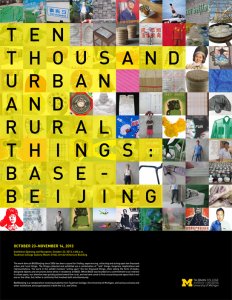Presented By: A. Alfred Taubman College of Architecture + Urban Planning
Ten Thousand Urban and Rural Things: BASEbeijing

The number ten thousand is not an exact number in Chinese. Traditionally, ten thousand was thought of as such an unimaginably large number that it became the equivalent of infinity. The concept includes everything you can point to or even name -- all of reality.
It is sometimes translated as "myriad creatures" or "ten thousand beings," but that makes one falsely assume that the concept includes only living creatures. The ten thousand things also includes inanimate objects (such as rocks, buildings, stars), emptiness (like outer space or vacuums), and abstractions (such as dreams, thoughts, principles, beliefs, language, the Internet).
The work done at BASEbeijing since 2006 has been a quest for finding, experiencing, collecting and acting upon ten thousand urban and rural things. The things collected and exhibited are a combination of "real" things, forgeries, duplications and representations. The work in the exhibit involved "acting upon" the ten thousand things, often taking the form of books, designed objects and structures done while in residence at BASE. While BASE was founded on a commitment to an interest in urban space, our attention was quickly pulled toward the rural, and we have come to find a surprising new space that is not one or the other, but rather a continuity that involves both simultaneously.
BASEbeijing is a collaboration involving students from Taubman College, the University of Michigan, and various schools in both the U.S. and China.
It is sometimes translated as "myriad creatures" or "ten thousand beings," but that makes one falsely assume that the concept includes only living creatures. The ten thousand things also includes inanimate objects (such as rocks, buildings, stars), emptiness (like outer space or vacuums), and abstractions (such as dreams, thoughts, principles, beliefs, language, the Internet).
The work done at BASEbeijing since 2006 has been a quest for finding, experiencing, collecting and acting upon ten thousand urban and rural things. The things collected and exhibited are a combination of "real" things, forgeries, duplications and representations. The work in the exhibit involved "acting upon" the ten thousand things, often taking the form of books, designed objects and structures done while in residence at BASE. While BASE was founded on a commitment to an interest in urban space, our attention was quickly pulled toward the rural, and we have come to find a surprising new space that is not one or the other, but rather a continuity that involves both simultaneously.
BASEbeijing is a collaboration involving students from Taubman College, the University of Michigan, and various schools in both the U.S. and China.